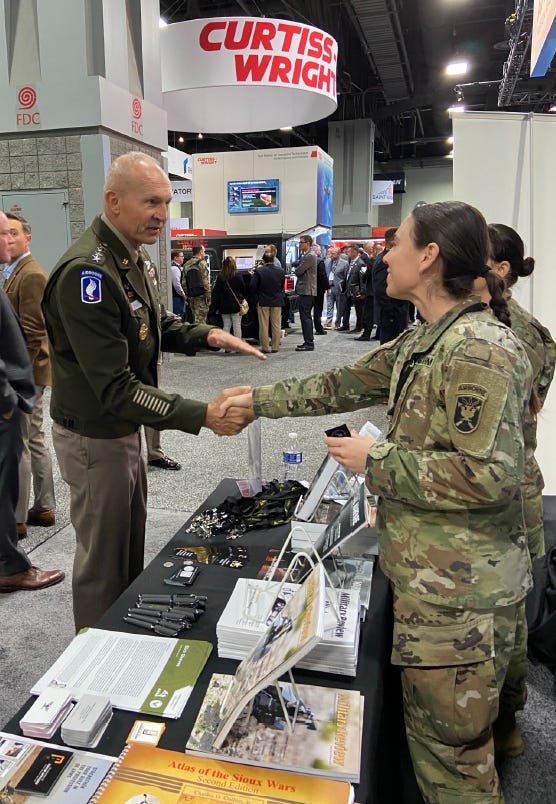Reflecting on AUSA
Harding Fellows discuss what surprised, motivated, and informed them at AUSA 2024
After a few naps and a week of reflection, two themes emerged from the 2024 Association of the United States Army (AUSA) event. The first is the palpable excitement surrounding the revitalization of professional writing, with widespread recognition of its potential benefits for the Army. However, the Harding Project’s message unfortunately still has not reached all echelons, signaling the need for Harding Fellows to increase efforts to broaden awareness.
Captain Emily Lopez discusses the Harding Project with the Chief of Staff at AUSA 2024.
At AUSA, the Harding Project aimed to promote awareness of the Chief of Staff of the Army’s initiative to revitalize the Army’s professional journals. Harding Fellows gathered insights from a diverse audience on professional writing by engaging with attendees at the Army University Press (AUP) kiosk and participating in prominent panels such as the Leader’s Solarium and the Warrior’s Corner.
Conversations with attendees on the main exhibit floor and within various event rooms revealed a strong enthusiasm among professionals across the defense establishment for the rebuilding and repackaging of the Army’s professional journals on the Line of Departure website. Professional journals are essential tools for navigating a new era of change and adaptation, particularly as the Army confronts challenges in a tense geopolitical environment and a rapidly evolving technological landscape. While some attendees had only heard whispers of the Harding Project, many expressed surprise and delight at the progress made since its inception.
Filling the Gaps
The surprise and genuine interest expressed by AUSA attendees suggested that awareness of the Harding Project is growing, even still more efforts are needed to broaden its reach within the Army and the defense establishment. Harding Fellows are stationed at various Centers of Excellence (COEs) across the Army’s different branches—you can view each branch’s journal on Line of Departure. These COEs, along with their professional military education (PME) institutions, serve as hubs for producing the Army’s professional journals.
While this arrangement offers certain advantages, it also has limitations that became evident at AUSA, where Soldiers from diverse backgrounds converged. Although flag officers down to field-grade and junior officers in close proximity to the COEs and PME institutions are generally aware of the Harding Project's existence and goals, many Soldiers in the operational force lack awareness of both the Harding Project and the relevance of branch-specific journals. This gap is pronounced among field-grade officers, junior officers, and enlisted personnel.
To address this issue, Harding Fellows at the Special Operations Center of Excellence, in collaboration with the Army University Press, are conducting Leadership Professional Development sessions focused on professional writing for operational units. These initiatives connect the COEs with the operational force, educate Soldiers on relevant command research priorities, and highlight writing resources. The objective is to ensure that publishable articles address relevant questions that benefit both the operational force and the COEs.
“Writing has no rank”
The Harding Project’s presence at AUSA was enhanced by contributions to the Leader’s Solarium Panel and Warrior’s Corner. These headline events offered an invaluable platform to highlight the relevance of professional writing in today’s Army. The panels emphasized the importance of unit writing programs, providing battalion and brigade command teams with practical tools and guidance to implement these initiatives successfully.
One fact highlighted in these events was that the strength of any writing program lies not just in its establishment, but in the ongoing cultivation of Soldiers’ writing skills. Confidence in writing and publishing is fostered with consistent engagement and resourcing, which over time embeds these practices within Army culture. Question-and-answer sessions revealed strong interest in expanding writing opportunities for non-commissioned officers (NCOs), like the NCO Journal.
The phrase “writing has no rank” resonated strongly at AUSA, especially among NCOs interested in contributing to professional discourse. The Harding Project recognizes that the voices of NCOs —who often have frontline experience and are an important facet of a unit’s institutional knowledge and continuity—are essential to the Army’s broader professional dialogue.
Moving Forward
For Harding Fellows who could not attend AUSA, there were useful insights gained from the event worth sharing. The engagement with attendees showed an interest from multiple branches, research fields, industry partners, and organizational leaders in the benefits that revitalized, professional military journals can bring to the Army. These journals are vital for addressing the complex challenges during the current interwar period.
AUSA served as a venue for Harding Fellows to connect with professionals across the defense establishment, fostering relationships with potential advocates and authors eager to help with that revitalization process. The enthusiasm of AUSA attendees to share solutions that improve the Army aligns with the objective of the Harding Project—to steward the Army profession through current and future challenges. AUSA serves as an illustration for why the Harding Project matters: the myriad parties and topics of interest in professional dialogue highlights the need for coherent forums to explore ideas, concepts, and solutions that will help secure victory in the next conflict the United States faces.
There is still much work ahead. The message of the Harding Project has yet to reach all levels, and success will require persistent engagement with respective COEs and bold outreach to the operational force. Realizing the full potential of professional writing in the Army will require unwavering commitment and relentless effort to push this initiative forward — Fellows, it is time to answer the call!




